Adverb and its Kinds | English Grammar for Class 6 PDF Download
| Table of contents |

|
| What is an Adverb? |

|
| Types of Adverbs |

|
| Recognizing Adverbs |

|
| Formation of Adverbs |

|
What is an Adverb?
- An adverb is a word that modifies or gives more information about a verb, an adjective, or another adverb.
- Adverbs help us understand more about how, when, where, and to what extent something happens.
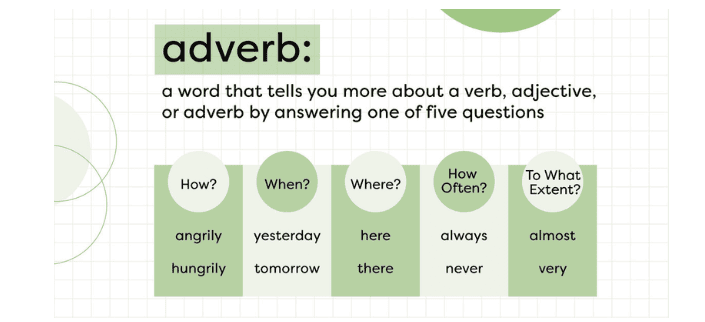
Types of Adverbs
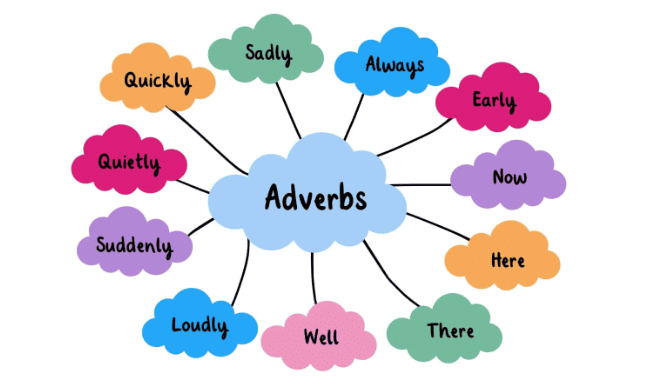
1. Adverbs of Time
These adverbs tell us when an action happens. They are usually placed at the beginning or end of a sentence.- Examples:
- "Lately, you have been coming early to the football practice."
- "We recently bought a puppy."
- "We go out for morning tea daily."
Common Adverbs: annually, daily, recently, soon, yet, during, before, now, then
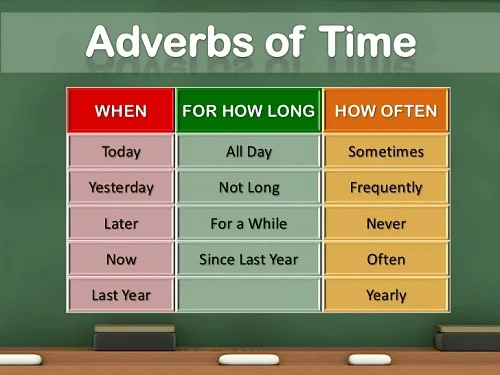
2. Adverbs of Place
These adverbs describe where an action happens. They usually come after the main verb or the object of the sentence.- Examples:
- "The girl who took my phone was nowhere to be found."
- "There were blue butterflies everywhere in the garden."
- "Clearly, there aren’t any Pokémon here."
Common Adverbs: here, there, nowhere, everywhere, out, in, above, below
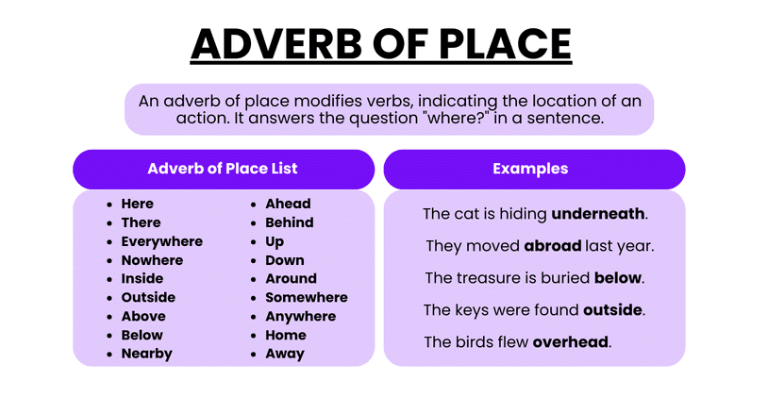
3. Adverbs of Degree
These adverbs tell us about the intensity or degree of an action or quality. They are often placed before the word they modify.- Examples:
- "You have hardly read that chapter."
- "His health is extremely critical."
- "I am so excited to go to the new amusement park."
Common Adverbs: almost, quite, nearly, too, very

4. Adverbs of Manner
These adverbs describe how an action is performed. They often end in -ly and are usually found at the end of a clause.- Examples:
- "She ironed and folded the clothes neatly."
- "We can discuss this matter calmly."
- "He carefully labeled all the files given to him."
Common Adverbs: neatly, slowly, quickly, sadly
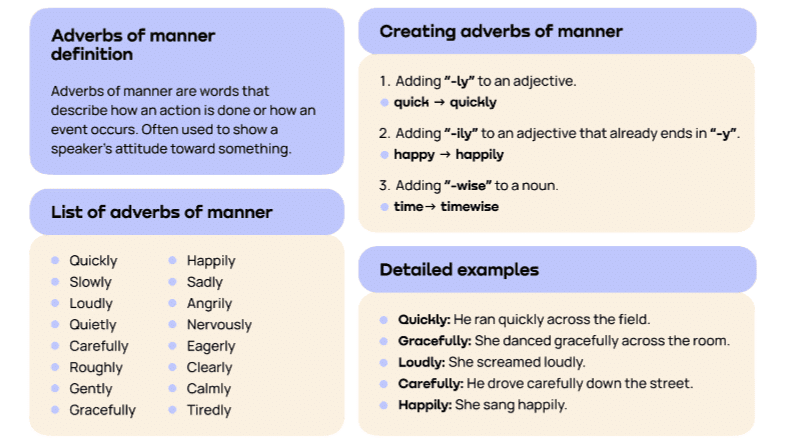
5. Adverbs of Frequency
These adverbs tell us how often an action occurs. They usually come before the main verb in a sentence.- Examples:
- "I always call my mother before I sleep."
- "She rarely talks to anyone these days."
- "They usually go to restaurants on weekends."
Common Adverbs: never, always, rarely, sometimes, usually
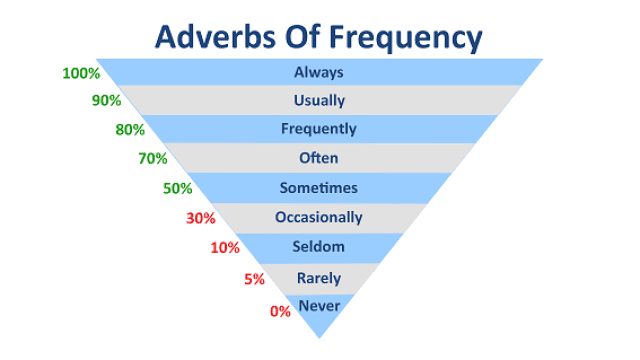
6. Adverbs of Reason or Cause
These adverbs explain why an action is performed.- Examples:
- "He is very indisciplined. He cannot, therefore, be taken in the team."
- "She talked too much in class. She was hence turned out of the class."
Common Adverbs: therefore, thus, hence, so, because
7. Adverbs of Affirmation or Negation
These adverbs express affirmation (yes) or negation (no).- Examples:
- "I do not know."
- "Yes, I will help you."
- "No, I am not willing to rest here."
Common Affirmations: surely, certainly, definitely
Common Negations: no, not, never
8. Interrogative Adverbs
These adverbs are used to ask questions.- Examples:
- "When do you get up?"
- "Why are you late?"
- "Where do you live?"
Common Adverbs: when, why, how, where, how often
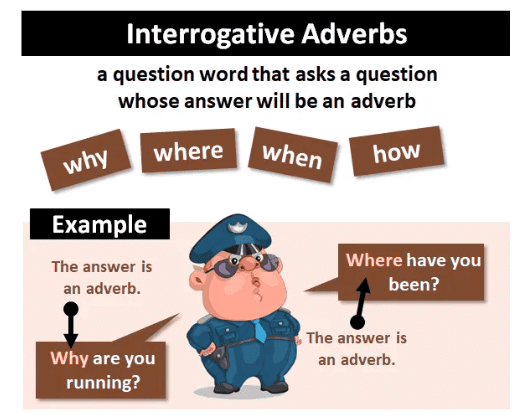
9. Relative Adverbs
These adverbs connect clauses and refer back to some antecedent.- Examples:
- "This is the place where the accident took place."
- "I do not understand the reason why he has behaved thus."
Common Adverbs: where, why, when

Recognizing Adverbs
Sometimes, adverbs can have the same forms as adjectives, making it tricky to identify them. Here’s a simple way to differentiate:
- Adjectives describe nouns (e.g., "He is a fast runner." — fast describes runner).
- Adverbs modify verbs, adjectives, or other adverbs (e.g., "He runs fast." — fast describes runs).
Examples of Adjective vs. Adverb:
- Adjective: "This is a fast train." (Describes the train)
- Adverb: "This train runs fast." (Describes how the train runs)
Formation of Adverbs
- From Adjectives: Add -ly to adjectives (e.g., brave → bravely, careful → carefully).
Sometimes we may have to change the spellings slightly before adding -“ly”
- From Nouns: Add -ly to nouns (e.g., day → daily, month → monthly).
- From Participles: Add -ly to participles (e.g., loving → lovingly, hurried → hurriedly).
- Using Prefixes:
(a) Nouns:
Abed (a = on), ablaze, abreast, aboard, adown, afoot, again, ahead, aloud, astir, apace, apart, ashore, aside, etc.
(b) Verbs:
across, ado, ago, arise, asleep
(c) Adjectives:
abroad, afresh, akin, aloud, alone, alike, anew, around etc.
Be – beside (be = by), below, behind, beyond etc. - Using Prepositions: Add prepositions to form adverbs (e.g., thereby, therein).
- Different Meanings: Some adverbs have different meanings based on their form.

Certain words that end in “ly” are not Adverbs; they are Adjectives. Here are a few examples:
1. The girls played a friendly match. (qualifies the match)
2. This food has a sickly taste. (qualifies taste)
3. A cub has a curly coat. (qualifies coat)
4. She has a deep manly voice. (qualifies voice)
Other adjectives: costly, cowardly, godly, heavenly, likely, lonely, lovely, orderly, sickly, slovenly, stately, untimely etc.
Two Adverbs that go together joined by conjunctions; as, All in all, again and again, by and by, off and on, far and near, far and again, off and on, far and near, far and wide, far and away, over and above, once and again, off and on, out and out, first and foremost, now and then, now or never, now and again, through and through, to and fro.
|
49 videos|349 docs|46 tests
|
FAQs on Adverb and its Kinds - English Grammar for Class 6
| 1. What is an adverb? |  |
| 2. What are the types of adverbs? |  |
| 3. How can adverbs be recognized in a sentence? |  |
| 4. How are adverbs formed? |  |
| 5. What are the different kinds of adverbs in Class 6 grammar? |  |
















